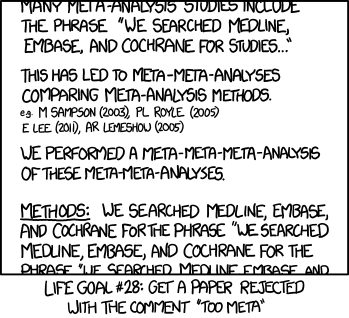1447: Meta-Analysis
| Meta-Analysis |
 Title text: Life goal #29 is to get enough of them rejected that I can publish a comparative analysis of the rejection letters. |
Explanation
In the scientific literature, meta-analyses are studies which compare multiple studies on a single topic, with the aim of giving a balanced overview of the known results. Medline, Embase and Cochrane are medical research databases which give access to studies on drug effects or results of other medical procedures.
This comic explores the idea of iterating the process, going from meta-analyses to meta-meta-analyses (which actually exist, though not necessarily by that name, see below) and hence to a meta-meta-meta-analysis.
Of course, the title text adds another level of meta-analysis, since he wants to make a meta-analysis of rejection letters which concern his meta-meta-meta analyses.
All of the cited meta-meta-analyses are real: M. Sampson (2003), P. L. Royle (2005), E. Lee (2011), and A.R. Lemeshow (2005).
The phrase "too meta" can be found in the comments of videos, blog posts, and other internet content for which the commentator claims they are so abstract that they can't be easily interpreted. It refers to the thing in question being too self-referential, but could just be a cursory dismisal of the presented content.
Comic 93: Jeremy Irons similarly states a slightly absurd "life goal". 917: Hofstadter is "meta"-related.
Transcript
- [Excerpt from a scientific paper.]
- Many meta-analysis studies include the phrase “We searched Medline, Embase, and Cochrane for studies…”
- This has led to meta-meta-analyses comparing meta-analysis methods. e.g. M Sampson (2003), PL Royle (2005), E Lee (2011), AR Lemeshow (2005).
- We performed a meta-meta-meta-analysis of these meta-meta-analyses.
- Methods: We searched Medline, Embase, and Cochrane for the phrase “We searched Medline, Embase, and Cochrane for the phrase ‘We searched Medline, Embase, and [cut off]
- [Caption below the panel:]
- Life goal #28: get a paper rejected with the comment “Too meta”
Discussion
What is this "Medline, Embase and Cochrane" ? Thanks. Dams. 108.162.254.30 (talk) (please sign your comments with ~~~~)
- Databases of Medical Publications 108.162.254.30 08:19, 14 November 2014 (UTC)
- Medline[1], Embase[2] and Cochrane[3] are medical research databases. You can find there studies on various drug uses or treatment plans. A useful information source if you want to compare studies on use of Allopurinol for chronic gout or else. Jkotek (talk) 08:28, 14 November 2014 (UTC)
- Seems to me that should be in the explanation, no? -- Brettpeirce (talk) 15:03, 14 November 2014 (UTC)
Would it be helpful to include a breakdown of the terms?
- Meta-Analysis = "We searched M, E, & C for [keyword]"
- Meta-Meta-Analysis = "We searched M, E, & C for 'We searched M, E, & C for [keyword]'"
- Meta-Meta-Meta-Analysis = "We searched M, E, & C for 'We searched M, E, & C for 'We searched M, E, & C for [keyword]""
Smperron (talk) 08:46, 14 November 2014 (UTC)
- Okay so... Is Meta-Meta-Meta-Meta-Analysis just "We searched M, E, & C for 'We searched M, E, & C for 'We searched M, E, & C for 'We searched M, E, & C for [keyword]"""? 162.158.28.184 (talk) 04:58, 7 April 2025 (please sign your comments with ~~~~)
Your paper is rejected. //"TOO META"--Theme (talk) 08:49, 14 November 2014 (UTC)
IMHO a better would be this:
- Meta-Analysis = "We searched M, E, & C for [keyword] and compared results between each other"
- Meta-Meta-Analysis = "We analyzed how others 'search the M, E, & C for for [keyword] and compare the results'"
- Meta-Meta-Meta-Analysis = "We analyzed how other 'analyze how others search the M, E, & C for for [keyword] and compare the results'"
too meta Jkotek (talk) 15:22, 14 November 2014 (UTC)
I don't understand this explanation! Why isn't there an "Explain Explain XKCD" site? --RenniePet (talk) 23:43, 15 November 2014 (UTC)
- I don't understand this comment! We need a Explain XKCD comment comments section!--108.162.231.199 09:51, 19 November 2014 (UTC)
It seems that Randall actually enjoys rejections. 173.245.50.139 03:18, 18 November 2014 (UTC)
The term "too meta" means that something is too self referential. Not "so abstract that they can't be easily interpreted." 108.162.254.88 (talk) (please sign your comments with ~~~~)
- Actually, if we stick to the greek root, "meta" simply signifies "beyond", or "after". So, by adding level after level of analysis, by going beyond single studies, and single studies of single studies, it is truly becoming "too meta", too grand. 108.162.229.207 21:17, 31 March 2015 (UTC)
- My interpretation is that it could mean both. For example, "too meta" = "the strenght of meta is too high" for being too self referential or "too meta" = "there's too many metas" for the excess or abstraction. I'm now experiencing Semantic satiation. 188.114.99.189 18:43, 1 December 2015 (UTC)
How much paper is there?
If the paper is a meta-meta-meta-analysis, then the paper is discussing the paper is discussing the paper? Is the Methods section (near-)infinite? How much paper does Randall have? 108.162.246.164 17:22, 14 September 2022 (UTC)
- Papers are mostly paperless these days. 172.69.34.10 20:34, 14 September 2022 (UTC)
- Maybe he's a quitter. L-Space Traveler (talk) 14:17, 20 March 2023 (UTC)
Meta-meta-…-meta-analysis
Meta-analyses may use other permutations (like "We searched Embase, Cochrane and Medline for…"). Since there are 3 databases, the number of permutations is 6 for each iteration. All iterations are independent from the others, so there are 36 possibilities in a meta-meta-meta-analysis, and 46,656 in a meta-meta-meta-meta-meta-meta-meta-analysis.
Since the number of possibilities increases exponentially, a meta-meta-meta-meta-meta-meta-meta-meta-meta-meta-meta-meta-meta-meta-meta-meta-meta-meta-meta-meta-analysis would have over 1014 permutations, much more than what can be handled by hand, a meta-meta-meta-meta-meta-meta-meta-meta-meta-meta-meta-meta-meta-meta-meta-meta-meta-meta-meta-meta-meta-meta-meta-meta-meta-meta-meta-meta-meta-meta-analysis has over 3.6 · 1022, and a meta-meta-meta-meta-meta-meta-meta-meta-meta-meta-meta-meta-meta-meta-meta-meta-meta-meta-meta-meta-meta-meta-meta-meta-meta-meta-meta-meta-meta-meta-meta-meta-meta-meta-meta-meta-meta-meta-meta-meta-meta-meta-meta-meta-meta-meta-meta-meta-meta-meta-meta-meta-meta-meta-meta-meta-meta-meta-meta-meta-meta-meta-meta-meta-meta-meta-meta-meta-meta-meta-meta-meta-meta-meta-meta-meta-meta-meta-meta-meta-meta-meta-meta-meta-meta-meta-meta-meta-meta-meta-meta-meta-meta-meta-meta-meta-meta-meta-meta-meta-meta-meta-meta-meta-meta-meta-meta-meta-meta-meta-meta-meta-meta-meta-meta-meta-meta-meta-meta-meta-meta-meta-meta-meta-meta-meta-meta-meta-meta-meta-analysis has about as many possibilites as the estimated number of elementary particles (although I found no meta-meta-meta-meta-analysis or beyond on the web and only 1 study said to be a meta-meta-meta-analysis). 172.70.42.25 18:14, 22 May 2024 (UTC)